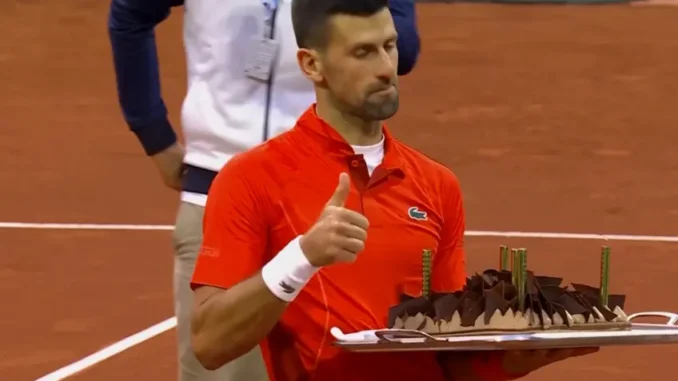
As the clay courts of Roland Garros loom on the horizon, Novak Djokovic, the 24-time Grand Slam champion, is leaving no stone unturned in his pursuit of a record-extending 25th major title. The Serbian maestro, currently ranked world No. 6, has taken a wildcard entry into the ATP 250 Gonet Geneva Open, a strategic move to sharpen his game ahead of the French Open, which begins May 25, 2025. After a turbulent clay season marked by early exits and a withdrawal, Djokovic’s decision to compete in Geneva reflects his determination to rediscover the form that made him the 2023 Roland Garros champion. “I have the feeling that right now there is no better practice for me than match play,” he said, emphasizing his need for competitive reps to fine-tune his game for Paris.
Djokovic’s 2025 clay campaign has been uncharacteristically rocky. Early defeats in Monte-Carlo to Alejandro Tabilo (6-2, 6-3) and in Madrid to Matteo Arnaldi (6-3, 6-4) exposed vulnerabilities, while his last-minute withdrawal from the Rome Masters—his first absence from the event since 2007—raised eyebrows. These setbacks, coupled with a season devoid of titles or finals, have left the 37-year-old grappling with a “new reality,” as he described it after his Madrid loss. “It’s a completely different feeling from what I had in 20-plus years of professional tennis,” Djokovic admitted, acknowledging the mental challenge of early exits. Yet, his choice to return to Geneva, where he reached the semifinals in 2024, signals an unwavering commitment to reclaiming his dominance on the Parisian clay.
In Geneva, Djokovic joins a competitive field featuring Norway’s Casper Ruud, the defending champion and recent Madrid winner, and American Taylor Fritz, ranked world No. 4. The Serbian’s opening match against a yet-to-be-determined opponent will mark his first competitive outing since Madrid, offering a chance to build rhythm on a surface where he’s won three of his 24 majors. Last year, his Geneva stint—where he notched a milestone 1,100th career win against Yannick Hanfmann—provided crucial momentum, propelling him to the Roland Garros quarterfinals before an injury forced his withdrawal. “I need more matches, even if it’s one match, two matches, three, four hopefully,” Djokovic said in 2024, a sentiment that resonates as he returns to Switzerland. His 38th birthday on May 22 adds a poignant backdrop, with fans hoping the Swiss crowds will serenade him as they did last year with a birthday cake and song.
Djokovic’s Roland Garros preparation is not without risks. His 2024 Geneva campaign ended with a semifinal loss to Tomas Machac, compounded by an upset stomach that left him physically drained. “It’s not enjoyment when you are suffering on the court,” he said then, highlighting the toll of his health struggles. This year, with only two clay matches under his belt, both losses, the stakes are higher. A strong showing in Geneva could restore the confidence that has eluded him, while a poor performance might amplify doubts about his ability to contend in Paris. “I’m not sure if I’ll be able to play my best tennis at Roland Garros, but I’ll do my best,” he said recently, tempering expectations while clinging to his trademark ambition.
In Paris, Djokovic faces a daunting draw. No longer among the top four seeds due to his ranking slip, he could encounter Jannik Sinner, Carlos Alcaraz, or Alexander Zverev as early as the quarterfinals. His first-round opponent, French wildcard Pierre-Hugues Herbert, offers a winnable start, but the road ahead includes potential clashes with surging Americans Tommy Paul or Taylor Fritz. Despite these challenges, Djokovic’s history at Roland Garros—where he’s reached 12 semifinals and defeated Rafael Nadal twice—makes him a perennial threat. “For the Grand Slams, I’m a different player,” he asserted, a reminder of his ability to elevate his game when the stakes are highest.
Off the court, Djokovic’s preparation reflects a broader evolution. His decision to part ways with coach Goran Ivanisevic and other team members in 2024 signaled a desire for fresh perspectives, though he’s yet to announce a new coaching setup. His philanthropy, through the Novak Djokovic Foundation, and his role as a UNICEF Goodwill Ambassador continue to shape his legacy, balancing his fierce competitive drive with a commitment to social good. As he navigates this pivotal moment, Djokovic’s focus remains forward-looking. “I hope to find my best game on the courts of Roland Garros, Wimbledon, the Olympics, and the US Open,” he said, eyeing a blockbuster summer.
Geneva, with its serene lake views and intimate crowds, is more than a pitstop—it’s a crucible for Djokovic to forge the resilience he’ll need in Paris. Whether he can translate match play into major glory remains uncertain, but his journey from Switzerland to France is a testament to his unrelenting pursuit of history. As the tennis world watches, Djokovic’s quest for a fourth Roland Garros title promises drama, determination, and the enduring brilliance of a champion who refuses to fade.
Leave a Reply